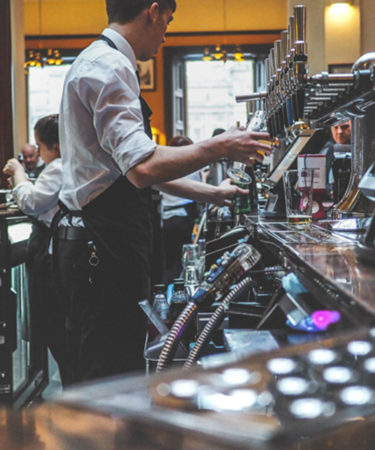Sometimes, even great bars are dead. It’s a holiday, maybe. Or there was an epic snowstorm. Or everyone in town is embracing Whole 30, Dry January, or something similarly unpleasant.
We were curious how bartenders pass those hours, so we asked 10 bar professionals across the country: What do you do when there’s no one at your bar?
“I’ve always been a cleaner. Clean and organize, organize and clean. Bars get really gross really quick if you let them, so there’s always something to be cleaned. Plus you usually find some great long lost bottles when you get down and clean the bottom shelf of that back cabinet no one really looks in all that often.” — Melissa Jura, Manager, Headwaters, Portland, Ore.
“I usually spend that time with my team to brainstorm cocktail ideas. Also, revisit old classics and test my team on their knowledge. A lot of times I go over my admin work or set up a research/study station. And there is no better way to pass time at a slow bar than to get everyone to clean!! Hands, hands, hands!!” — Christopher Longoria, Bar Director, Che Fico, San Francisco, Calif.
“There’s always something to clean behind the bar (shelves, bottles, fridges), so a slow shift is a great opportunity to make sure all of your tools and the bar are spotless. You can also work on some new recipes, which is more entertaining than cleaning.” — Rael Petit, Beverage Director, The Williamsburg Hotel, Brooklyn, N.Y.
“Cleaning and studying simultaneously. I like to pull down bottles from the back bar, clean, and as I put them back, study each bottle. Both front and back. There’s a ton of information provided for us right on the labels. Menus create a uniformity to a selection of spirts, whereas labels help producers communicate to us what is important to them, such as an age statement or type of oak used.” — Dusty Grable, Beverage Director, Merriman’s Hawaii
“The best way to deal with slow days is to just keep moving, cleaning, and prepping… We like to joke that Murphy’s law is restaurant law; by that I mean the moment you start deep cleaning a section of the bar is the moment that guests will start arriving. Sometimes it can be fun to tempt fate by taking on big projects in the middle of a super-slow night.” — Eddie Riddell, Bar Manager, Trifecta Tavern, Portland, Ore.
“We do a deep cleaning of the bar. We literally take everything out and shine everything like it’s new. We organize things that have been misplaced. We do a complete inventory to see what is missing so it can be replaced. We practiced cocktails we’ve forgotten and refresh anything we’re probably doing wrong. We repair any machines that wasn’t quite working at 100 percent and get it ready for busy season.” — Juyoung Kang, Lead Bartender, The Dorsey, The Venetian, Las Vegas, Nev.
“It’s an oldie but a goodie: Time to lean, time to clean. There is always something to spiffy up, whether it’s dusting the back bar, cleaning in cubby holes and under and around less-often-used tools and their containers. I also use downtime to keep up on small projects like refilling garnish jars and tincture/dropper bottles, and mixing backups of small-batch ingredients like saline solution and house-made bourbon vanilla extract. Perhaps I’ll do a little cocktail R&D if I’m working on a new drink.” — Charlie Gleason, Bartender, Paley’s Place, Portland, Ore.
“This is the best time to create even better relationships with the few guests you do have. I’ve gotten to know all kinds of people on slow shifts better than I would have had the bar been busy. Several years ago, I had only one person at my bar for at least three to four hours. We ended up talking about everything you could think of and became friends. We even had beers together the next time I visited California. One of the best parts about working in a bar is that every day is different, you never know who you’ll meet or encounter. If you spend your slow periods complaining, scrolling around on your phone, or what have you, you could miss out on truly valuable experiences — as well as the potential to create future regulars.” — Anne Beccara, Beverage Director, Treadwell Park, NYC
“When the bar is dead, it is the perfect time to think about a new cocktail you’d like to create, try it, and if you happen to have one person at the bar, become friends and ask if they would like to be your taste-tester. You can also wave and smile at people passing by the street. In most cases, they will probably smile back, or better yet, come in.” — Charles Fayet, Co-Owner, La Cafette, Brooklyn, N.Y.
“Passing the time on slow nights is tough. There are always super-boring cleaning projects or R&D to do, but I think a really important place to put your focus is on giving the best service possible… It’s not like we’re stuck in cubicles or staring into the numbing light of a computer screen. The restaurant industry is supposed to be fun. Slow days are at least slow with good company.” — Alex Blair, Bartender, OK Omens, Portland, Ore.
